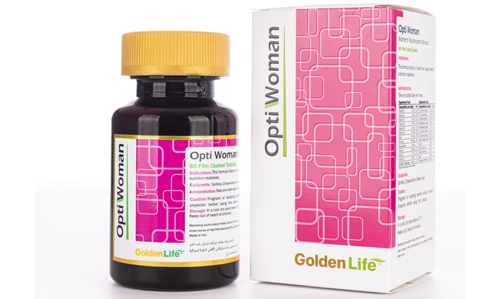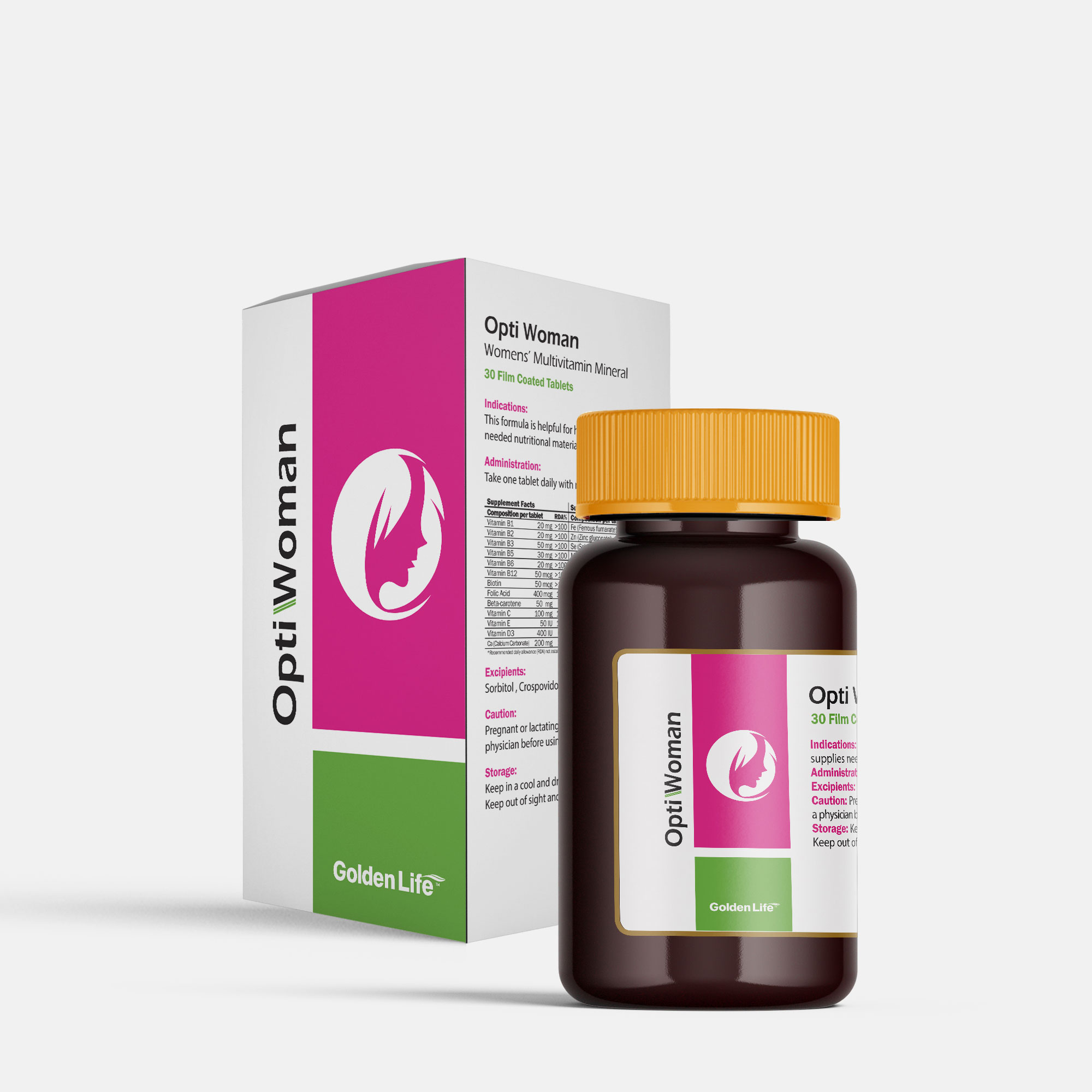Golden Life
Optiwoman


RDA = Recommended daily allowance
IU = International unit
UL = Upper limi
| UL | RDA (%) | Amount Per Serving | Ingredients |
| * | 1818 | 20 mg | Vitamin B1 |
| * | 1818 | 20 mg | Vitamin B2 |
| 35 mg/day | 357 | 50 mg | Vitamin B3 |
| * | 600 | 30 mg | Vitamin B5 |
| 100 mg/day | 1538 | 20 mg | Vitamin B6 |
| * | 2083 | 50 mcg | Vitamin B12 |
| * | 167 | 50 mcg | Biotin |
| 1000 mcg/day | 100 | 400 mcg | Folic acid |
| * | * | 50 mg | Beta-carotene |
| 2000 mg/day | 111 | 100 mg | Vitamin C |
| 1500 IU/day | 275 | 50 IU | Vitamin E |
| 4000 IU/day | 66 | 400 IU | Vitamin D3 |
| 2500 mg/day | 20 | 200 mg | Ca (Calcium Carbonate) |
| 45 mg/day | 139 | 25 mg | Fe (Ferrous fumarate) |
| 40 mg /day | 100 | 15 mg | Zn (Zinc gluconate) |
| 400 mcg/day | 91 | 50 mcg | Se (Selenomethionine) |
| 350 mg/day | 16 | 50 mg | Mg (Magnesium oxide) |
| 11 mg | 62.5 | 2 mg | Mn (Manganese sulphate) |
| 1000 mcg/day | 120 | 30 mcg | Cr (Chromium picolinate) |
| 10000 mcg/day | 42 | 375 mcg | Cu (Copper gluconate) |
| 1100 mcg/day | 509 | 764 mcg | Iodine (Potassium iodide) |
| * | * | 15 mg | Silica |
| * | * | 25 mg | Inositol |
| * | * | 40 mg | Siberian Ginseng |
| * | * | 57 mg | Milk thistle |
- Boosts energy levels, supports metabolism and thyroid function
- Helps prevent anemia and meets Iron requirement relieves PMS symptoms
- Keeps healthy skin, bone, hair & nails
- Supports immune system
- Relieves stress, enhances female sexual desire
- Supports liver detoxification and helps regenerate hepatic cells
Siberian ginseng
Siberian ginseng is an herb used in traditional medicine to combat fatigue and improves body stamina and mental responses. It is an adaptogen compound that helps in relieving stress .It can also improve physical performance during periods of high intensity exercise and boosts immune system.
Milk thistle
The main content of the herb is a flavonoid called silymarin that protects the liver from toxins. Silymarin has antioxidant and anti-inflammatory properties. And it may help the liver repair itself by growing new cells.
Vitamin B1
Thiamin (vitamin B1) helps the body's cells change carbohydrates into energy. The main role of carbohydrates is to provide energy for the body, especially the brain and nervous system.
Vitamin B2
Riboflavin, vitamin B2, is a heat-stable, water-soluble vitamin that the body uses to metabolize carbohydrates, fats, and protein into glucose for energy. In addition to boosting energy, this vitamin functions as an antioxidant for the proper functioning of the immune system, healthy skin, and hair.
Vitamin B3
It helps keep your nervous system, digestive system and skin healthy. Niacin (vitamin B-3) is often part of a daily multivitamin, but most people get enough niacin from the food they eat.
Vitamin B5
vitamin B5 is critical to the manufacture of red blood cells, as well as sex and stress-related hormones produced in the adrenal glands, small glands that sit atop the kidneys.
Vitamin B6
Make antibodies. Antibodies are needed to fight many viruses, infections, and other diseases.
Maintain normal nerve function.
Make hemoglobin. Hemoglobin carries oxygen in the red blood cells to the tissues. .
Break down proteins. ...
Keep blood sugar (glucose) in normal ranges.
Vitamin B12
Vitamin B12 is needed to form red blood cells and DNA. It is also a key player in the function and development of brain and nerve cells. Vitamin B12 binds to the protein in the foods we eat. In the stomach, hydrochloric acid and enzymes unbind vitamin B12 into its free form.
Biotin
Your body needs biotin to metabolize carbohydrates, fats, and amino acids, the building blocks of protein. Biotin is often recommended for strengthening hair and nails, and it's found in many cosmetic products for hair and skin. Like all B vitamins, it is a water soluble, meaning the body does not store it.
Folic acid
Folic acid is crucial for proper brain function and plays an important role in mental and emotional health. It aids in the production of DNA and RNA, the body's genetic material, and is especially important when cells and tissues are growing rapidly, such as in infancy, adolescence,
Beta-carotene
beta-carotene converts into vitamin A (retinol). We need vitamin A for good vision and eye health, for a strong immune system, and for healthy skin and mucous membranes.
Vitamin C
Vitamin C is needed for the growth and repair of tissues in all parts of your body. It is used to: Form an important protein called collagen, used to make skin, tendons, ligaments, and blood vessels.
Vitamin E
It helps keep the immune system strong against viruses and bacteria. It helps form red blood cells and widen blood vessels to keep blood from clotting inside them. It helps the body use vitamin K. Cells also use vitamin E to interact with each other.
Vitamin D3
Vitamin D helps you absorb calcium and phosphate from food. It is important for bone and muscle strength and immune function, and it may have other benefits such as helping prevent inflammatory disease.
Ca (Calcium Carbonate)
calcium for muscles to move and for nerves to carry messages between your brain and every part of your body. Calcium also helps blood vessels move blood throughout your body and helps release hormones that affect many functions in your body. Vitamin D helps your body absorb calcium.
Fe (Ferrous fumarate)
Iron is a mineral that the body needs for growth and development. Your body uses iron to make hemoglobin, a protein in red blood cells that carries oxygen from the lungs to all parts of the body, and myoglobin, a protein that provides oxygen to muscles
Zn (Zinc gluconate)
It is needed for the body's defensive (immune) system to properly work. It plays a role in cell division, cell growth, wound healing, and the breakdown of carbohydrates. Zinc is also needed for the senses of smell and taste.
Se (Selenomethionine)
Selenium is a constituent of 25 selenoproteins, including thioredoxin reductases, glutathione peroxidases, and selenoprotein. Selenoproteins play critical roles in thyroid hormone metabolism, DNA synthesis, reproduction, and protection from oxidative damage and infection
Mg (Magnesium oxide)
Magnesium is required for energy production, oxidative phosphorylation, and glycolysis. It contributes to the structural development of bone and is required for the synthesis of DNA, RNA, and the antioxidant glutathione.
Mn (Manganese sulphate)
Manganese is an essential trace element that is naturally present in many foods and available as a dietary supplement. Manganese is a cofactor for many enzymes, including manganese superoxide dismutase, arginase, and pyruvate carboxylase.Through the action of these enzymes, manganese is involved in amino acid, cholesterol, glucose, and carbohydrate metabolism; reactive oxygen species scavenging; bone formation; reproduction; and immune response.
Cr (Chromium picolinate)
Chromium is among the essential minerals that the body requires to function its best physiologically. Humans require trace amounts of chromium, particularly those who are very active, as chromium and other minerals in their diets ensure that these individuals can sustain increased levels of energy and work.
Cu (Copper gluconate)
It helps your body make red blood cells and keeps nerve cells and your immune system healthy. It also helps form collagen, a key part of bones and connective tissue. Copper may also act as an antioxidant, reducing free radicals that can damage cells and DNA.
Iodine (Potassium iodide)
- Promoting thyroid health. Iodine plays a vital role in thyroid health. ...
- Reducing risk for some goiters. ...
- Managing overactive thyroid gland. ...
- Treating thyroid cancer. ...
- Neurodevelopment during pregnancy. ...
- Improving cognitive function. ...
- May help treat fibrocystic breast disease. ...
- Disinfecting water.
Silica
This mineral is concentrated in all connective tissues including nails, hair and skin, where it contributes to collagen formation. Collagen serves as the structural framework for skin. This trace mineral helps the body utilize calcium properly, and improves the strength of nails. Silica also helps Strengthens hair and prevents hair loss. It contributes to the formation of keratin sulfate, a component of the hair shaft. It may also increase scalp circulation and stimulates hair growth. Deficiency in silica can result in the hair loss.
Inositol
Inositol is a carbohydrate found in the body and food. Inositol supplements may help treat anxiety and fertility disorders, as well as help promote better health.
Oral, take one tablet daily with meal.
Contraindications
No contraindications have been reported to date.
This product is safe to use by pregnant or lactating women.
Pregnant or lactating women should consult a physician before using this product.
Interactions
No interaction with other medicinal products has been reported to date.
No adverse effect has been reported to date.